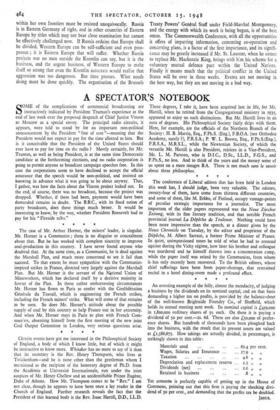A SPECTATOR'S NOTEBOOK
OME of the complications of commercial broadcasting are S instructively indicated by President Truman's experience at the end of last week over the proposed despatch of Chief Justice Vinson
to Moscow as a special envoy. The principal radio circuits, it appears, were told to stand by for an important non-political announcement by the President " free of cost "—meaning that the President would not expect to pay for the time allotted to him. But is it conceivable that the President of the United States should ever have to pay for time on the radio ? Mostly certainly, for Mr. Truman, as well as being President, is at the same time Democratic ,candidate at the forthcoming elections, and no radio corporation is going to permit anyone to broadcast campaign speeches free. In this 'case the corporations seem to have declined to accept the official assurance that the speech would be non-political, and insisted on knowing in advance what it was going to be about anyway. That, I gather, was how the facts about the Vinson project leaked out. In the end, of course, there was no broadcast, because the project was dropped. Whether, if there had been, payment would have been demanded remains in doubt. The B.B.C., with its fixed ration of party broadcasts, does these things much better. It would be interesting to know, by the way, whether President Roosevelt had to pay for his " Fireside talks."


































 Previous page
Previous page